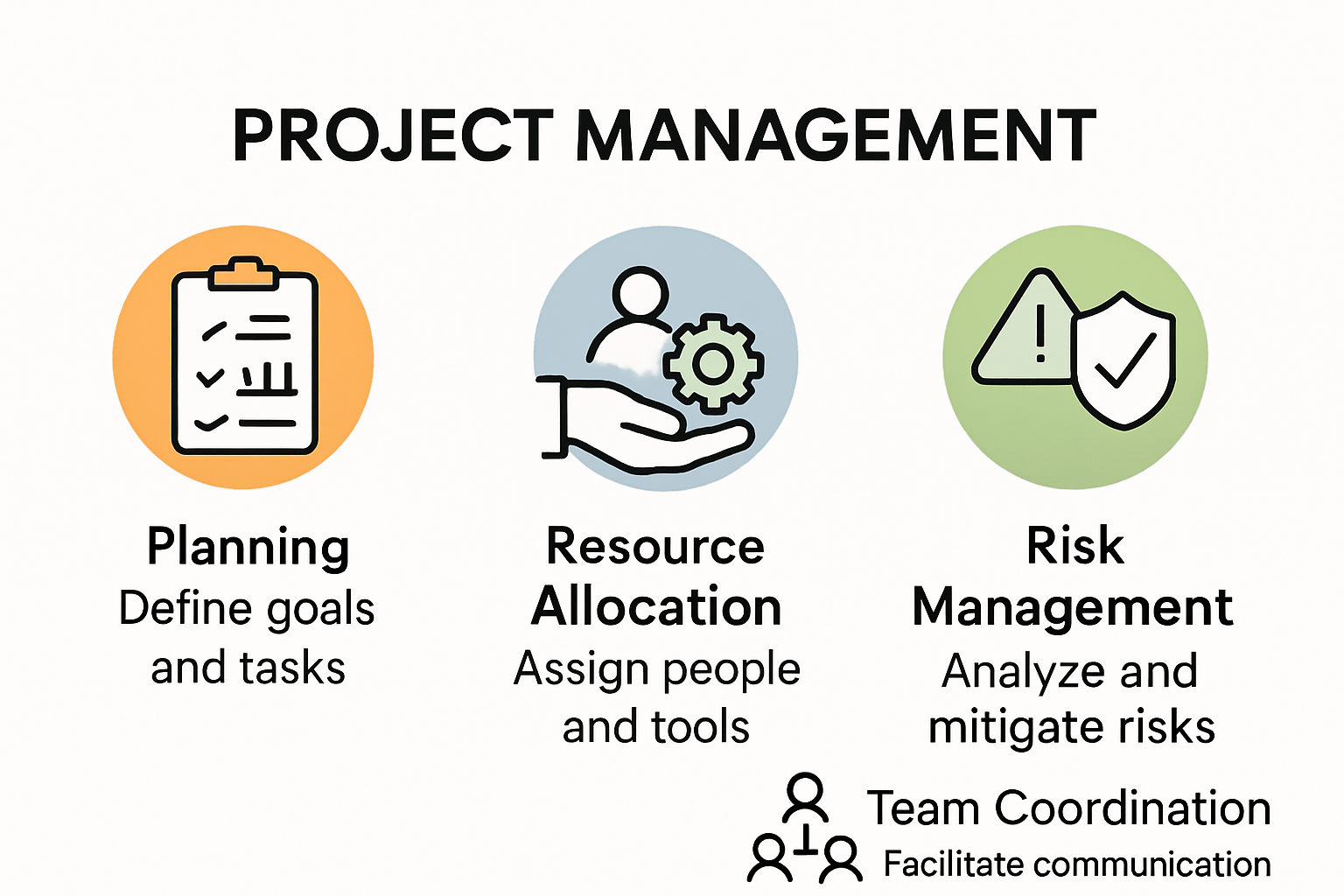Project management shapes how businesses succeed, but its true impact often goes unseen. Studies show that 37 percent of project failures are caused by poor communication and unclear goals. That number is eye-opening. Most people think mastering the latest technology is what makes a great manager. The surprise is, your real advantage comes from clear communication, adaptable planning, and understanding team dynamics, not just fancy tools. Here’s why what you ignore could set you apart in 2025.
Table of Contents
- What Is Project Management And Why It Matters
- Key Steps In Project Management For Beginners
- Must-Have Tools And Techniques In 2025
- Common Challenges And Expert Tips For Success
Quick Summary
| Takeaway | Explanation |
|---|---|
| The Importance of Project Management in Business | Project management is essential for achieving strategic objectives, improving productivity, enhancing decision-making, maximizing resource utilization, and driving innovation in a competitive landscape. |
| Key Steps for Beginners in Project Management | Beginning project management involves three critical steps: Project initiation (defining core purpose), Planning (detailing project deliverables and timelines), and Execution (implementing plans and adaptive leadership). |
| Integration of AI and Technology | Advanced technologies like AI and digital collaboration tools are pivotal for enhancing efficiency, optimizing team dynamics, and improving communication in project management. |
| Addressing Communication and Resource Challenges | Overcoming communication barriers and effectively managing resources are crucial for project success; strategies include stakeholder mapping, transparent reporting, and balanced workload distribution. |
| Mitigating Cognitive Biases | Understanding and addressing cognitive biases through objective risk assessment and diverse perspectives helps in making informed decisions and avoiding project pitfalls. |
What Is Project Management and Why It Matters
Project management is a strategic approach that transforms complex ideas into successful outcomes by systematically planning, executing, and controlling work to achieve specific organizational goals. In an increasingly competitive business environment, understanding project management is crucial for professionals across various industries.
The Core Definition of Project Management
At its essence, project management is a disciplined methodology for guiding teams through a structured process of achieving specific objectives within defined constraints. According to the Project Management Institute, project management involves applying knowledge, skills, tools, and techniques to meet project requirements and deliver value to organizations.
Project management is not just about completing tasks. It encompasses a comprehensive approach that includes:
- Strategic Planning: Defining clear project goals and creating a roadmap for success
- Resource Allocation: Efficiently managing people, budget, and materials
- Risk Management: Identifying and mitigating potential challenges before they impact project outcomes
- Team Coordination: Ensuring effective communication and collaboration among team members

Why Project Management Matters in Modern Business
Research from Harvard Business Review reveals that organizations with strong project management practices are significantly more likely to achieve their strategic objectives. In 2025, project management has become even more critical due to rapidly changing technological landscapes and increasing business complexity.
The impact of effective project management extends far beyond simply completing tasks. It directly influences an organization’s ability to:
- Improve Productivity: Streamline workflows and reduce inefficiencies
- Enhance Decision Making: Provide clear metrics and insights for strategic choices
- Maximize Resource Utilization: Optimize human and financial resources
- Drive Innovation: Create structured environments that support creative problem solving
The Evolution of Project Management in 2025
According to the Project Management Body of Knowledge (PMBOK), project management has evolved from a linear process to a more adaptive and flexible approach. Modern project managers must now integrate advanced technologies, understand complex global ecosystems, and rapidly adjust to changing market conditions.
In 2025, successful project management requires a blend of technical skills, emotional intelligence, and technological proficiency. Professionals must be adept at using AI-driven tools, managing remote teams, and creating resilient project frameworks that can quickly adapt to unexpected challenges.
Whether you are a team leader, entrepreneur, or aspiring manager, mastering project management principles will be a critical differentiator in your professional journey. By understanding its core principles and strategic importance, you can transform complex challenges into successful, measurable achievements.
Key Steps in Project Management for Beginners
Navigating the world of project management requires a systematic approach that transforms complex objectives into achievable results. For beginners, understanding the fundamental steps is crucial to developing a robust project management strategy that drives success.
Project Initiation: Laying the Foundation
According to the Project Management Institute, the first critical step in project management is the initiation phase. This foundational stage involves defining the project’s core purpose, establishing clear objectives, and creating a comprehensive project charter.
Key activities during project initiation include:
- Defining Project Scope: Clearly outline what the project will and will not accomplish
- Identifying Stakeholders: Recognize all individuals and groups with a vested interest in the project
- Developing Initial Project Charter: Create a formal document that authorizes the project’s existence
Beginners should focus on asking critical questions: What problem are we solving? What are the expected outcomes? Who are the key stakeholders? Research from Harvard Business Review emphasizes that clarity at this stage prevents misunderstandings and sets the groundwork for successful project execution.
Planning and Preparation: Building Your Roadmap
The planning phase is where project management transforms from concept to actionable strategy. Experts from McKinsey recommend developing a detailed project plan that breaks down complex objectives into manageable components.
Critical planning elements include:
- Scope Definition: Detailed breakdown of project deliverables
- Resource Allocation: Identifying and assigning team members and resources
- Timeline Development: Creating a realistic project schedule with clear milestones
- Risk Assessment: Identifying potential challenges and developing mitigation strategies
Beginners should invest time in creating a comprehensive project plan. This serves as a living document that guides the project and allows for flexible adjustments as circumstances change.
Execution and Monitoring: Bringing the Project to Life

The execution phase is where theoretical planning meets practical implementation. Project management research indicates that successful project management requires continuous monitoring and adaptive leadership.
Key strategies for effective project execution include:
- Regular Communication: Maintain transparent and frequent team updates
- Performance Tracking: Use key performance indicators (KPIs) to measure progress
- Adaptive Management: Be prepared to adjust plans based on real-time feedback
- Quality Control: Consistently evaluate deliverables against initial project objectives
For beginners, the most challenging aspect of project management is often maintaining momentum and managing team dynamics. Successful project managers learn to balance technical skills with strong interpersonal communication and leadership abilities.
Remember, project management is a skill that improves with practice. Each project presents unique challenges and opportunities for learning. By following these fundamental steps and maintaining a flexible, strategic approach, beginners can develop the confidence and competence needed to successfully manage complex projects in any professional environment.
To help beginners visualize the primary stages involved, the following table summarizes the key steps in the project management process:
| Phase | Primary Goal | Key Activities |
|---|---|---|
| Initiation | Define project purpose & objectives | Defining scope, identifying stakeholders, creating charter |
| Planning | Build roadmap & allocate resources | Detailing deliverables, resource assignment, timeline, risks |
| Execution & Monitoring | Implement plan & track progress | Communication, KPIs, adaptive management, quality control |
Must-Have Tools and Techniques in 2025
As project management continues to evolve, professionals must stay ahead of technological advancements and innovative methodologies. The landscape of project management tools and techniques in 2025 demands a strategic approach that combines cutting-edge technology with human expertise.
Artificial Intelligence and Automation in Project Management
Research from McKinsey reveals that artificial intelligence is revolutionizing project management by providing unprecedented insights and efficiency. AI-powered tools are transforming how teams plan, execute, and monitor projects.
Key AI-driven capabilities include:
- Predictive Analytics: Forecasting project risks and potential delays
- Intelligent Resource Allocation: Optimizing team assignments and workload distribution
- Automated Reporting: Generating real-time project performance insights
- Natural Language Processing: Enhancing communication and documentation
According to the Project Management Body of Knowledge, the integration of AI requires project managers to develop new skills in data interpretation and technological adaptability. Professionals must learn to work alongside AI tools, using them as strategic partners rather than simple automation solutions.
Agile and Adaptive Project Management Techniques
Research from Harvard Business Review highlights the continued importance of flexible methodologies in 2025. Agile techniques have evolved beyond traditional software development to become a critical approach across various industries.
Emerging adaptive techniques include:
- Hybrid Methodologies: Combining traditional and agile approaches
- Iterative Development: Breaking projects into smaller, manageable cycles
- Collaborative Frameworks: Emphasizing team flexibility and cross-functional communication
- Continuous Improvement: Implementing real-time feedback and adaptation
Professionals are now expected to be versatile, switching between different project management approaches based on specific project requirements and organizational needs.
Digital Collaboration and Remote Project Management Tools
Gartner Research indicates that digital collaboration tools have become essential for modern project management. The rise of distributed teams and global workforces demands sophisticated technological solutions.
Critical digital collaboration features include:
- Cloud-Based Project Management Platforms: Enabling real-time collaboration
- Virtual Whiteboarding Tools: Supporting creative brainstorming and visual planning
- Advanced Communication Channels: Integrating video, chat, and project tracking
- Cybersecurity-Enhanced Collaboration: Ensuring secure information sharing
Successful project managers in 2025 must be technologically proficient, understanding how to leverage these tools to create seamless, efficient workflows across diverse team structures.
The future of project management is not about replacing human skills but augmenting them with intelligent technologies. By embracing these tools and techniques, professionals can create more responsive, efficient, and innovative project management approaches that drive organizational success in an increasingly complex business environment.
The next table provides a side-by-side comparison of must-have project management tools and methodologies discussed for 2025:
| Tool/Technique | Main Purpose | Key Features/Benefits |
|---|---|---|
| AI & Automation Solutions | Enhance insights & efficiency | Predictive analytics, auto reporting, NLP |
| Agile/Adaptive Methodologies | Support flexible & iterative workflows | Hybrid models, collaboration, feedback cycles |
| Digital Collaboration Platforms | Enable remote teamwork | Cloud-based, real-time chat/whiteboarding, secure sharing |
Common Challenges and Expert Tips for Success
Project management is a complex discipline fraught with challenges that can derail even the most meticulously planned initiatives. Understanding these obstacles and developing strategic approaches to overcome them is crucial for professionals seeking consistent project success.
Navigating Goal Alignment and Communication Barriers
Research from Project Management Institute reveals that 37% of project failures stem from poorly defined goals and inadequate communication strategies. This statistic underscores the critical importance of establishing clear, measurable objectives from the project’s inception.
Key strategies for overcoming communication challenges include:
- Stakeholder Mapping: Identifying and understanding all project stakeholders
- Transparent Reporting: Creating consistent, clear communication channels
- Regular Check-ins: Implementing structured progress meetings
- Expectation Management: Aligning project outcomes with stakeholder expectations
According to Harvard Business Review, successful project managers must develop a nuanced communication approach that balances technical precision with interpersonal sensitivity.
Resource Management and Team Dynamics
McKinsey Research indicates that 60% of project professionals struggle with resource allocation and team management. These challenges can lead to burnout, decreased productivity, and project delays.
Expert recommendations for effective resource management include:
- Skill Mapping: Matching team members to tasks based on individual strengths
- Workload Balancing: Preventing team member overallocation
- Continuous Training: Investing in team skill development
- Psychological Safety: Creating an environment that encourages open communication
The key is to view team management as a dynamic process that requires constant adaptation and empathetic leadership.
Mitigating Cognitive Biases and Project Risks
Research published in academic journals highlights the significant impact of cognitive biases in project management. These psychological blind spots can lead to unrealistic expectations, poor decision-making, and ultimately, project failure.
Strategies for overcoming cognitive biases include:
- Objective Risk Assessment: Using data-driven approaches to evaluate project risks
- Diverse Perspectives: Incorporating multiple viewpoints in decision-making
- Pre-mortem Analysis: Imagining potential failure scenarios before project initiation
- Continuous Learning: Documenting and analyzing past project outcomes
Successful project managers approach challenges with a combination of strategic thinking, emotional intelligence, and a commitment to continuous improvement. By recognizing potential pitfalls and developing proactive mitigation strategies, professionals can significantly increase their likelihood of project success.
Remember, challenges are not obstacles but opportunities for growth and innovation. Each project presents a unique learning experience that can enhance your skills and contribute to your professional development in project management.
Frequently Asked Questions
What are the key steps in project management for beginners?
The key steps in project management for beginners include project initiation (defining the project’s core purpose), planning (detailing deliverables, timelines, and resource allocation), and execution and monitoring (implementing the plan and tracking progress).
Why is project management important in modern business?
Project management is crucial in modern business because it helps organizations achieve strategic objectives, improve productivity, enhance decision-making, maximize resource utilization, and drive innovation amidst increasing complexity and competition.
What tools and techniques should beginners use for project management in 2025?
Beginners should utilize tools and techniques such as AI-driven project management solutions, agile methodologies, and digital collaboration platforms to improve efficiency, foster teamwork, and adapt to changing project dynamics.
How can beginners navigate communication barriers in project management?
Beginners can navigate communication barriers by implementing clear reporting structures, conducting regular check-in meetings, engaging in stakeholder mapping, and managing expectations through transparent communication channels.
Unlock Project Success with AI-Powered Project Management
Struggling to align your team and keep deliverables on track as you implement the essential project management steps outlined in this article? Many beginners face confusion, communication gaps, and wasted hours when managing complex tasks or adapting to new tools. It is easy to feel overwhelmed when juggling project planning, execution, and real-time collaboration—especially with the rapid changes forecasted for 2025.

Bring clarity to your projects and stop missing deadlines. Gammatica.com empowers you to overcome these pain points by providing an AI-driven platform designed for every stage discussed here. Enjoy automated workflow management, robust collaboration tools, and intuitive tracking features—all in one place.
Ready to free up 16 hours a week and turn project challenges into success stories? Start now and experience how Gammatica’s platform can streamline your project management, enhance team communication, and help you stay ahead of the curve. Visit Gammatica.com and take your first step toward seamless and scalable projects today.



